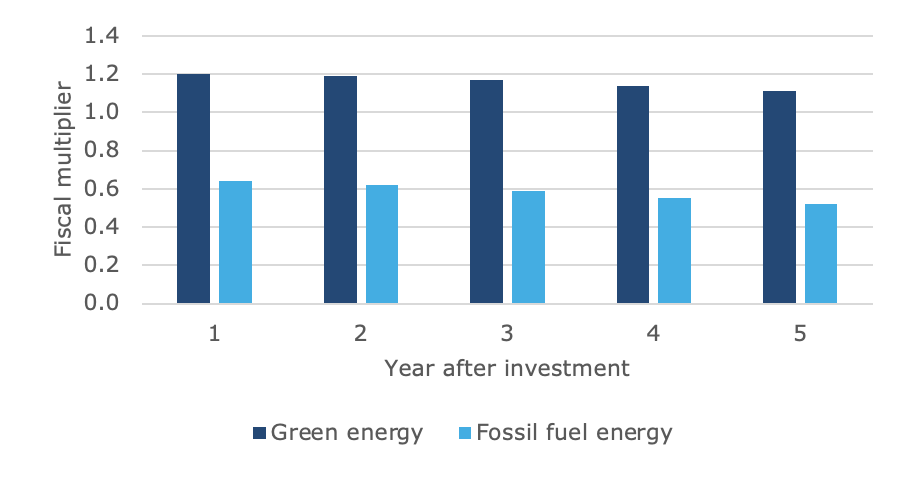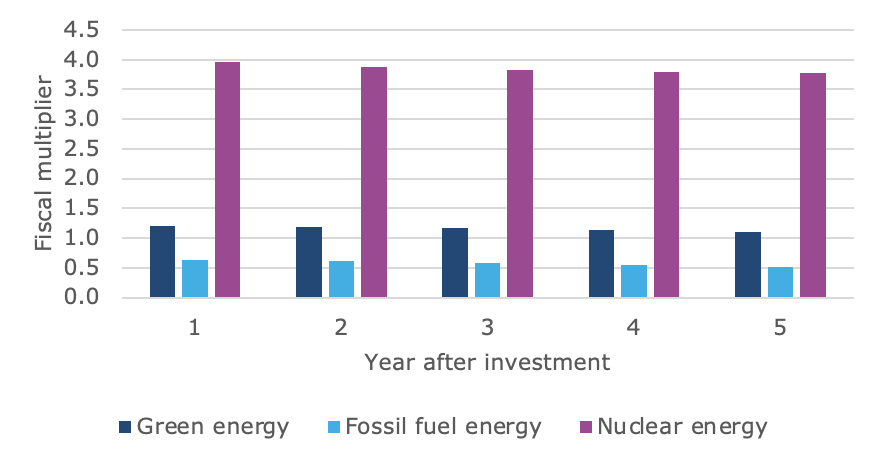When it comes to government spending, a key variable to identify is the fiscal multiplier. The fiscal multiplier measures how much economic output rises in response to one additional Dollar/Pound/Euro invested by the government. Multipliers above 1.0 is what governments are looking for because they mean that the economy (and thus tax revenues) grows more than what the government spends. As a reference, most infrastructure investments like roads have a fiscal multiplier around 1.1 to 1.3.
Nicoletta Batini and her colleagues have set out to measure the fiscal multiplier of green investments and compared them to the multipliers of other investments. To do that, they collected data on green energy government spending in 9 developed countries and 2 regions between 2003 and 2019 and compared it with government investments in fossil fuel energy projects and nuclear power. The chart below shows the, in my view stunning, result that investments in renewable energy are about twice as effective in stimulating growth than investment in fossil fuels. One key reason for that is that building wind and solar power plants is still very labour intensive and thus investments are spread across a larger number of people, many of which have lower incomes and thus are more likely to spend their income.
Fiscal multipliers for renewable energy and fossil fuel energy spending
Source: Batini et al. (2021)
So green energy investments are better for the environment and better for the economy. But wait, didn’t I say they also checked on the fiscal multipliers of nuclear power? Yes, they did, and the chart below shows the fiscal multiplier for nuclear power investments vs. green energy and fossil fuel energy investments. It isn’t even close. Nuclear power is such an accelerator to GDP growth and at the same time a green technology that we shouldn’t even have a debate about it. We should simply build as many nuclear power plants as we can to cover our basic electricity needs. And that is where the French are doing exactly the right thing…
Fiscal multipliers for nuclear power and other energy spending
Source: Batini et al. (2021)






The promise of nuclear energy is clear: It's the most effective means of reducing greenhouse gases and combating climate change while still meeting the world's growing demand for energy.
My main worries about nuclear power are:
Nuclear plants could be terrorist targets. If Greenpeace can set off fireworks inside a nuclear plant (e.g. https://www.thelocal.fr/20171012/greenpeace-activists-set-off-fireworks-at-nuclear-plant-in-france/), terrorists can likely do much worse, can't they?
What about nuclear waste? Has this problem been solved? Or is this not really a problem?
What about accidents? Are newer power plants really that much saver than older ones or is that mostly lobby talk?
I'm (almost) always ready to update my views. Are there sources on the above topics that you recommend, Klement?
Also: Electricity from new renewables seems to be cheaper than electricity from new nuclear (https://ourworldindata.org/cheap-renewables-growth). Does that hold up? If so: Why bother with new nuclear?